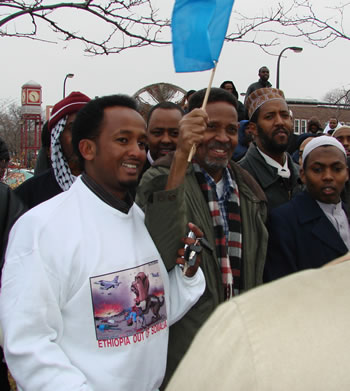This article is a brief look at somali history (1938-1967) through the eyes of former priminister abdirizak haji hussein.
http://digitalcommons.macalester.edu/cg ... t=bildhaan
brief exerts continued
The military police and
two other uniformed Italians physically assaulted him repeatedly. He
was later taken to a prison cell where others were kept. Soon, the others
were removed and he became the sole occupant of the cell. The
senior Somali prison warden was a pro-Italian man from Mogadishu,
an inspector named Daud Abdilla Hersi.Abdirazak did not realize that he was spitting blood as a result of
the beating until the following morning. He then came down with a
fever and could not eat the meager prison rations provided. No one
checked on his condition until the fourth day, when a Somali prison
inspector opened the cell door. He was shocked and asked why there
was so much blood in the cell. He immediately went to the D.C.’s
office and reported that the man in that cell was dying. The two came
together and the D.C. asked Abdirazak what happened, but he did not
respond. The Somali inspector then went to the Governor and told him
about Abdirazak’s condition. Disturbed by what he saw, the Governor
called his staff, including the D.C., and inquired about what had happened.
Everyone pretended that they did not know. An ambulance
took Abdirazak to the hospital.
Three major issues stand out in Abdirazak’s performance during his
tenure at Public Works. These projects singled him out as an upright
and activist minister, with an uncommon vision: the reorganization of
the ministry and an anti-corruption drive; the renegotiation with the
Soviets; and the creation of Somali Airlines and a telephone bid.
[/size]
Not surprisingly, once the new work ethic
was strictly enforced, many of the employees saw the new minister as
a monster bent on giving them an unnecessarily hard time. Word was
out in town that “Abdirazak burned staff at Interior and now was to
do the same in Public Works.”
One of Abdirazak’s major accomplishments during his tenure in
Public Works that unequivocally marked his commitment to a national
rather than a regional or “clan” agenda was the establishment of
Somali Airlines.

As a prominent minister, Abdirazak had many opportunities to
appropriate strategic plots of land in Mogadishu. All local governments
in the country, including the capital city, came under thepurview of the Ministry of Interior. He had only one plot of property
in Mogadishu that was vacant. It was this plot that attracted the most
curious interest from the American Embassy. One day, the American
Ambassador paid a visit to Abdirazak, during his days at Interior, to
discuss matters of concern to the Americans. Once these items were
concluded, the Ambassador shifted his attention to personal matters.
He informed Abdirazak that his plot overlooking the Indian Ocean
was nice property that the Embassy would be willing to develop without
any cost to him. In addition, the Embassy would occupy the new
building for five years after which the minister would take complete
ownership. Abdirazak was dumbfounded. Feeling caught off guard,
he asked the diplomat why the Embassy would want to do him this
favor and why not approach private business people like Yusuf Egal,
the entrepreneur who owned many parcels of land, including the compound
that housed the United Nations headquarters in Mogadishu. It
was now the Ambassador’s turn to be confounded, for the response
flew in the face of his hidden assumption that all African politicians
were on the take. But such a perspective was not unique to the United
States representatives. A few weeks later, the Italian petroleum company,
Aggib, made a similar offer. The company director came to see
Abdirazak and asked if they could get permission from the Public
Lands Department to have a plot at a strategic intersection of the major
Mogadishu-Afgoi road to build a gasoline station. Aggib would build
the station but Abdirazak, as their titular agent, would share in the
profits. However, in order to consummate the deal, Aggib needed the
minister to use his authority to secure the permit from the Department
of Public Land, a unit of his ministry. To be sure, this was a lucrative
offer. But the cost was even greater—severe damage to the integrity of
his office and the professional judgment of the staff. Aggib’s director
was dismayed by the rejection, but took the offer to Abdikadir Zoppo,
the Minister of Finance.










